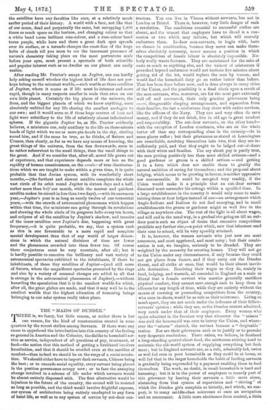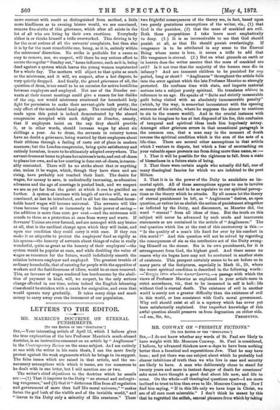THE "MAIDS OF DUNDEE."
THERE is, we fancy, but little reason, or rather there is but one reason, for the kind of consternation created in some quarters by the recent strikes among Servants. If there were any cause to apprehend the introduction into this country of the feeling so general in America and the Colonies, the dislike to household ser- vice as service, independent of all questions of pay, treatment, or food—the notion that this method of getting a livelihood involves humiliation, and that it should be avoided even at the sacrifice of comfort—then indeed we should be on the verge of a social revolu- tion. We should either have to import dark servants, Chinese being the best ; or to concede social equality, every servant being placed in the position governesses occupy now ; or to face the annoying change involved in a scheme of life under which servants would be almost entirely dispensed with. The first alternative would be injurious to the future of the country, the second will be resisted as long as possible, and the third would involve frightful expense, our system of architecture being entirely unadapted to any form of hotel life, as well as to any system of service by out-door con-
tractors. You can live in Vienna without servants, but not in London or Bristol. There is, however, very little danger of such a revolution. The conditions essential to successful strikes are absent, and the utmost that employers have to dread is a con- cession or two which may irritate, but which will scarcely embarrass them. In-door men-servants, to begin with, have no chance in combination, because they never can make them- selves absolutely necessary, never assume a position in which the competition of female labour is absolutely impossible. No- body really wants footmen. They are maintained for the sake of caste as much as anything else, and the vainest of aristocrats if provoked beyond endurance would not hesitate five minutes about getting rid of the lot, would replace the men by women, and would find the household duty go on rather better than before.
That has been done before now, and is done always in many cities of the Union, and the possibility is a final check upon a revolt of the men-servants, who, moreover, are for the most part extremely well off and contented, their only genuine grievances being ennui, disagreeable sleeping arrangements, and separation from their families, the last a misfortune they share with entire services, like the officers of the Navy. They can and very often do save money, and if they do not drink, live iu old age in great comfort and respectability. The out-door servants, on the other hand— with the exception of London coachmen, who are on the whole better off than any corresponding class in the country—do in some places suffer ; but their grievances as stated at Leamington are remediable, resolving themselves into two, that they are in- sufficiently paid, and that they ought to be lodged out-of-doors with their wives and families. The cry about pay is partly true, the men getting positively less than most skilled artisans—and a good gardener or groom is a skilled artisan — and getting it in a form which does not enable them to gratify the- natural ambition of saving for themselves ; and the proposal about lodging, which seems to be growing in favour, is neither oppressive nor unreasonable. It could be accepted very readily, if the Union would make it a principle that an out-door servant dismissed must surrender his cottage within a specified time. In a large establishment in the country it would only come to main- taining three or four lodges instead of one—an arrangement which Anglo-Indians and Italians do not find annoying, and in small establishments the groom or gardener might as well live in the village as anywhere else. The rest of the fight is all about wages, and will end in the usual way, in a gradual rise going on till an out- door post is such an object of desire that excessive competition prohibits any further rise,—a point which, now that labourers send their sons to school, will be very speedily attained.
It is, however, the women servants who just now are most numerous, and most aggrieved, and most noisy ; but their combi- nation is not, we imagine, seriously to be dreaded. They are- weighted by the necessity for securing homes. They will not go to the Union under any circumstances, if only because they could not get places from thence, and if they carry out the Dundee threat, and all strike at once, that would be their almost inevit- able destination. Receiving their wages as they do, mainly in food, lodging, and warmth, all conceded in England on a scale so liberal that a female servant who marries generally sacrifices physical comfort, they cannot save enough cash to keep them in idleness for any length of time, while they are entirely without the means of coercing or persuading competitors from the country, who once in-doors, would be as safe as their mistresses. Living so much apart, they are not much under the influence of their fellow- servants' opinion ; while they are, as the Dundee orators admitted, very much under that of their employers. Every woman who spoke admitted in the fuuniest way that wherever the " missus " was civil the housemaid was sure to betray the Union, and where- ever the " missus " chatted, the servant became a " despisable " traitor. Nor are their grievances such as to justify or to provoke- very desperate resolutions. There exists, we believe, in Scotland a long-standing quarrel about food, the mistresses striving hard to maintain the old-world system of supplying everything but flesh meat ; but in England servants are, as a rule, admirably fed, twice as well fed even in poor households as they could be at home, so well fed that in the larger households the habit of feeding servants is gradually being superseded by a payment enabling them to feed themselves. The work, no doubt, in small households is hard and harassing ; but it is in the power of employers to remedy part of this grievance by leaving their servants a little more alone, abstaining from that system of supervision and " driving " of which the Dundee girls complain so bitterly, and which, we sus- pect, is to many middle-class mistresses at once an occupation and an amusement. A little more abstinence from control, a little more content with result as distinguished from method, a little more kindliness as to evening leisure would, we are convinced, remove five-sixths of this grievance, which after all exists in the lot of all who are living by their own exertions. Everybody either is or thinks himself a trifle overworked. This driving is by far the most serious of all the servants' complaints, but then also it is by far the most remediable one, being, as it is, entirely within the mistresses' discretion. No strike is probable for a cause so easy to remove, nor, we suspect, will there be any serious effort to secure the regular " Sunday out," home influence, such as it is, being dead against a system which leaves the young women unprotected for a whole day. The mothers will object to that quite as much as the mistresses, and it will, we suspect, after a hot dispute, be very quietly dropped. And finally, the grand grievance of all, the question of dress, is too small to be an occasion for active hostilities between employers and employed. Not one of the Dundee ser- vants at their recent meetings could give a reason for her dislike of the cap, nor would mistresses straitened for household help fight for permission to make their servant-girls look pretty, the only effect of the much hated head-gear. The unreality of the fuss made upon this point is indeed demonstrated by the absurd compromise accepted with such delight at Dundee, namely, that if employers insist on the cap they should provide it, or in other words, should increase wages by about six shillings a year. As to dress, the servants in country towns have no doubt a grievance, being worried by their employers about their ribbons through a feeling of caste out of place in modern manners; but the London compromise, being quite satisfactory and entirely harmless, is sure to be ultimately adopted everywhere. The servant dresses at home to please her mistress's taste, and out-of-doors to please her own, and as her courting is done out-of-doors, is reason- ably contented. There will be no strike about that or anything else, unless it be wages, which, though they have risen and are rising, have probably not reached their limit. The desire for wages, for money to save, is undoubtedly increasing, as education advances and the age of marriage is pushed back, and we suspect we are as yet far from the point at which it can be gratified no further. A system of increase with length of service will, we are convinced, at last be introduced, and in all but the smallest house- holds board wages will become universal. The servants will like them because they add so immensely to their power of saving— the addition is more than cent. per cent.—and the mistresses will accede to them as a protection at once from worry and waste. If Servants' Unions are ever formed, and are managed with any brains at all, that is the cardinal change upon which they will insist, and upon one condition they could carry it with ease. If they can make it an etiquette to protect the employers' food as rigidly as his spoons—the honesty of servants about things of value is really wonderful, quite as great as the honesty of their employers'—the system would be popular at once, and while doubling the value of wages as resources for the future, would indefinitely smooth the relation between employer and employed. The greatest trouble of ordinary households, that of catering for people with the appetites of workers and the fastidiousness of idlers, would be at once removed. This, an increase of wages rendered less burdensome by the aboli- tion of payment in kind, will, we suspect, be the only serious change effected in our time, unless indeed the English labouring class should be stricken with a mania for emigration, and even that would operate very gradually. It takes many ships and much money to carry away even the increment of our population.



































 Previous page
Previous page